Intel Core (14th Gen) CPUs are Great for Every Kind of Gamer
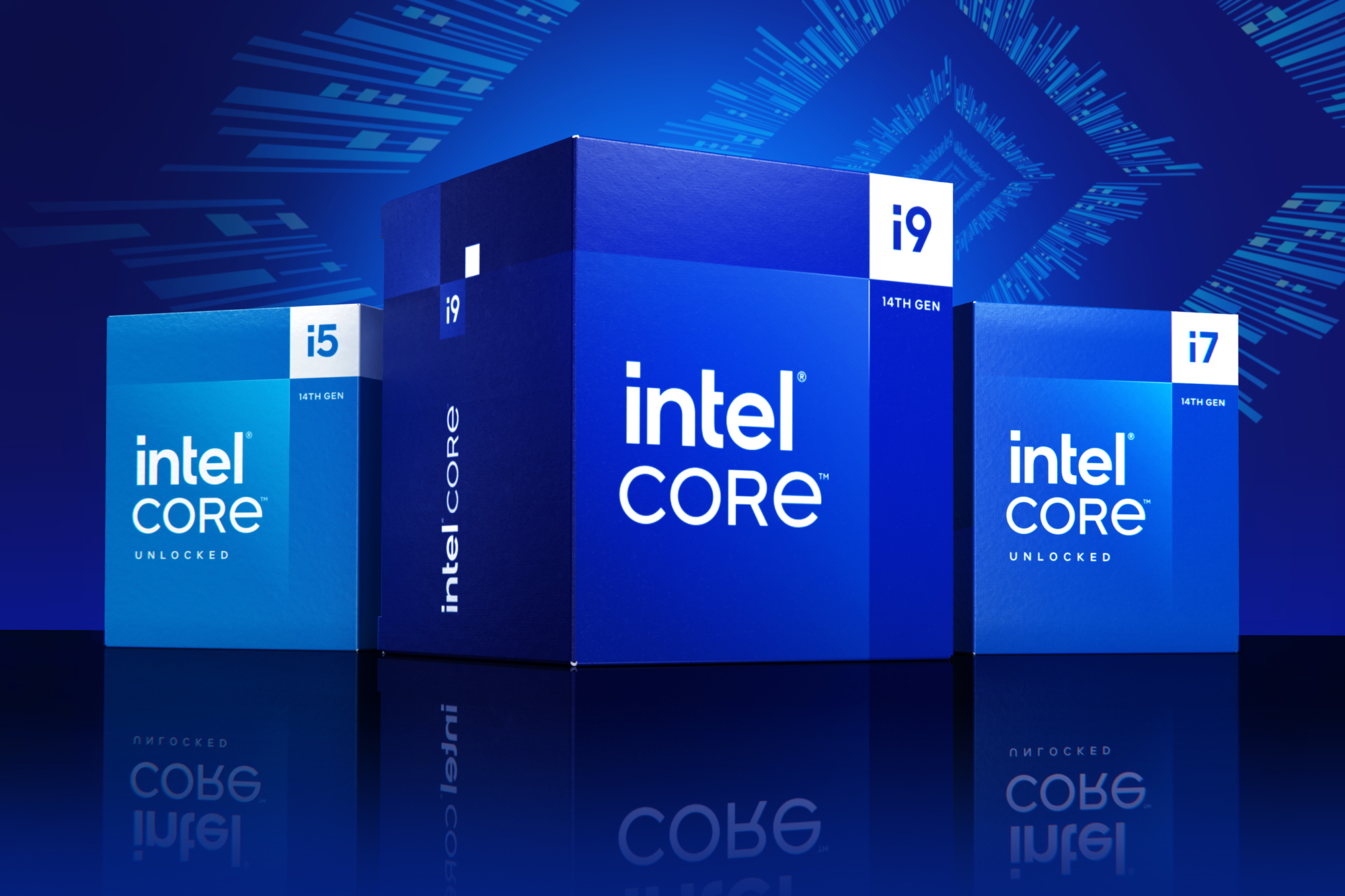
A CPU upgrade might at first seem less exciting than a GPU upgrade, but take a minute to think about just what impact your CPU has. From booting up your PC to logging in, opening a game client, maybe Discord, then your game and the game map, your CPU has affected everything along the way.
And yes, your CPU can affect your game frame rates, especially in certain CPU-intensive titles. Old processors simply don't cut it in many of today's games. Thankfully, Intel's latest desktop processor range has impressive options for every type of gamer in various price brackets.
The new Intel Core 14th Gen CPUs have something to offer not just enthusiasts, but also mainstream gamers, those who have professional workloads, and every kind of gamer in between. If you're looking to upgrade your build this year, we think you'll find what you're looking for with one of these processors.
And because these CPUs—the Intel Core i5-14600K, Intel Core i7-14700K, and Intel Core i9-14900K—are compatible with 600-series and 700-series motherboards, they make for an easy upgrade from a 12th Gen Intel Core CPU because they use the same LGA 1700 socket.
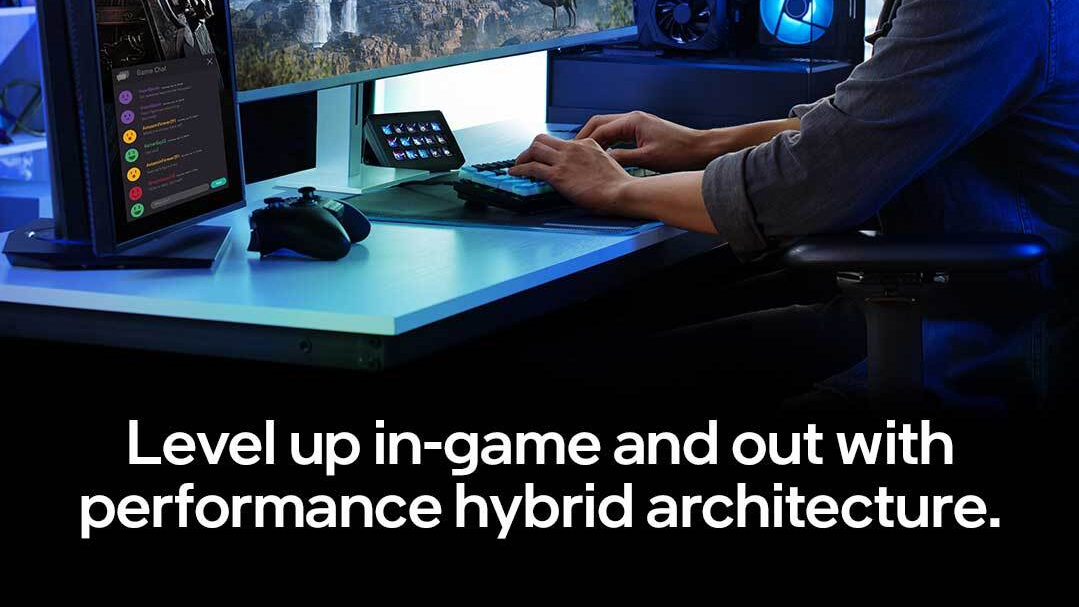
The Intel Core 14th Gen Processors are Powerful and Efficient for Gaming
It's no shock that Intel's latest desktop CPUs are powerful—for example, the Intel Core i9-14900K is the fastest desktop CPU at volume on the market right now with its 6GHz Max Turbo Frequency, going by Intel's October 2023 testing. But they also provide a smooth and efficient general desktop experience. This is thanks to their hybrid architecture which mixes Performance-cores (for heavy workloads) with Efficient-cores (for lighter background tasks).
Through some collaborative wizardry between the processor and operating system (Intel Thread Director and Windows scheduler), the CPU's P-cores and E-cores can be put to the tasks they're best at, improving efficiency. This can also improve gaming performance by ensuring the most powerful CPU cores focus on running the game while the E-cores handle background tasks.
This hybrid architecture also allows for an impressive piece of new software called Intel Application Optimization (APO), which optimizes and improves performance in select games by helping direct and schedule different CPU tasks more efficiently alongside the Thread Director. It can currently be used with the 14900K and 14700K.
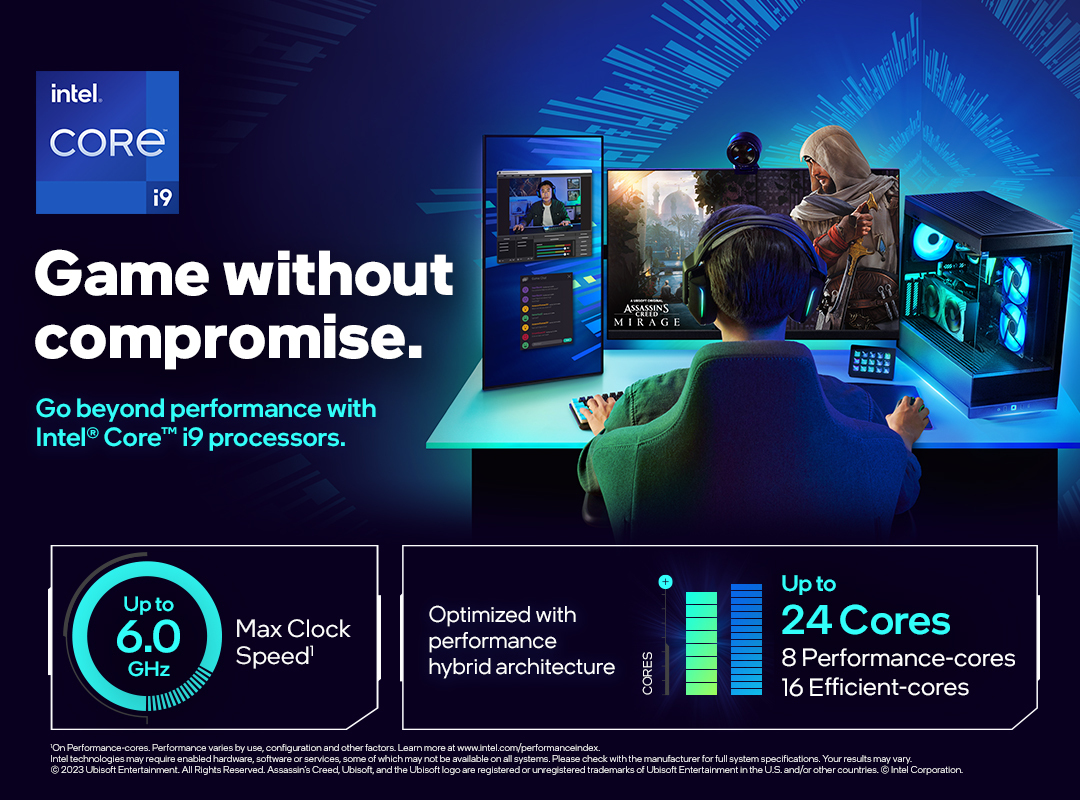
For Enthusiast Gamers with a Need for Speed
Intel Core i9 Processor 14900K
Cores (P+E): 8 + 16
Threads: 32
L3 Cache (Smart Cache): 36MB
L2 Cache: 32MB
Max Turbo Frequency: 6GHz
Processor Base Power: 125W
Maximum Turbo Power: 253W
RCP: $589-$599
The Intel Core i9-14900K is one of those CPUs that gives you bragging rights no matter your use case. If you have one in your system, you know you're getting top-tier performance in every task—including gaming. In other words, it's great for the enthusiast gamer.
When we reviewed this chip's predecessor, the Intel Core i9-13900K, we called it "the best of the best", because it has a lighting-fast 5.8GHz max Turbo clock and can power through professional, productivity, and gaming tasks with ease. The Intel Core i9-14900K, though, is even faster.
When Intel's Thermal Velocity Boost tech kicks in, the 14900K can reach a Max Turbo Frequency of 6GHz, 200MHz higher than the 13900K. This makes the 14900K the world's fastest desktop processor at volume (going by testing as of October 2023).
6GHz is no joke, especially for gaming. The biggest CPU-induced game performance increases usually come from faster and more powerful individual CPU cores, and in this the 14900K delivers. This makes the 14900K a go-to for best-in-class gaming performance, which is exactly what the enthusiast wants.
In fact, in our testing, we found the 14900K to perform better than any other CPU we compared it to in games like Metro Exodus and Far Cry 6—and that's even without enabling Intel's new framerate-boosting APO technology in Metro Exodus.
As expected at the top of the 14th Gen range, with the Intel Core i9-14900K we don't even sacrifice anything on the core count front for such a fast Turbo clock. In our testing we found its 24 cores (8x P- cores, 16x E-cores) deliver exceptional performance in applications and productivity, proving you don't always have to choose between gaming and professional application performance.
In short, then, the Intel Core i9-14900K is ideal for enthusiast gamers—those who are looking for unparalleled speed and who don't want to sacrifice much else to achieve it. It's for gamers who want the new "best of the best", to maximize in-game frame rates and crank their settings up to max at a high refresh rate.
Or, it's simply for those who want the bragging rights that come with owning a flagship CPU. And who wouldn't want that?
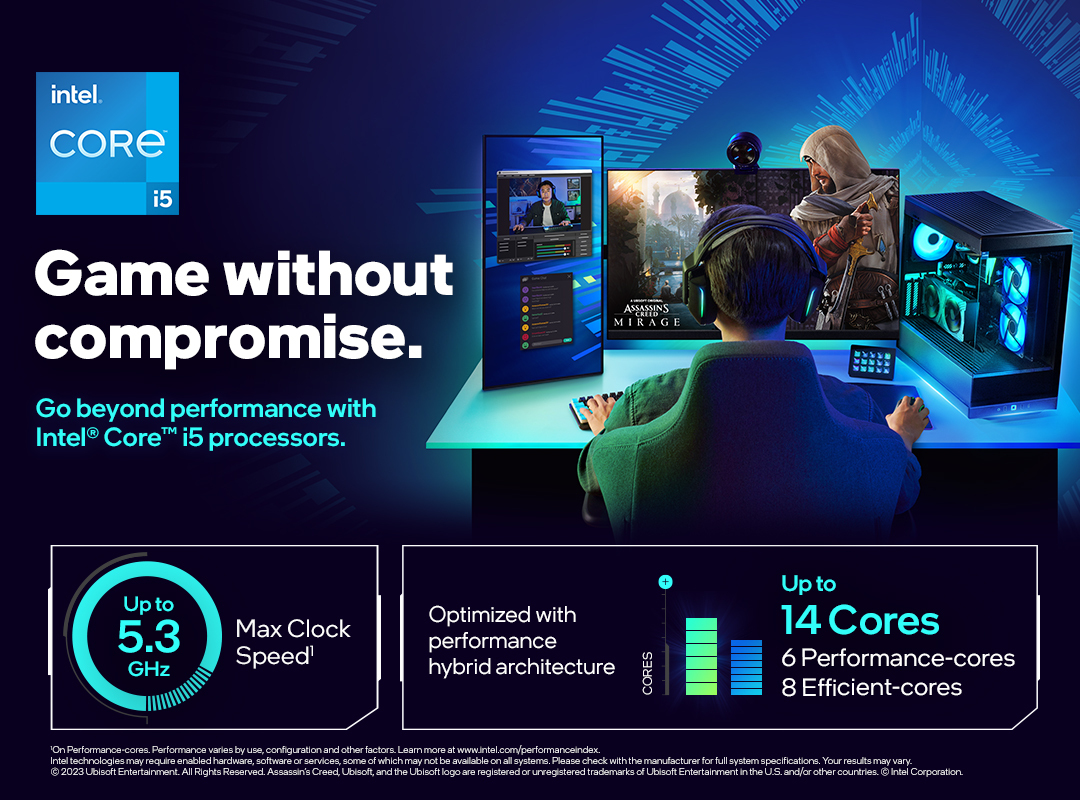
For the Casual or Core Gamer
Intel Core i5 Processor 14600K
Cores (P+E): 6 + 8
Threads: 20
L3 Cache (Smart Cache): 24MB
L2 Cache: 20MB
Max Turbo Frequency: 5.3GHz
Processor Base Power: 125W
Maximum Turbo Power: 181W
RCP: $319-$329
The Intel Core i5-14600K will probably be the processor that appeals to most PC gamers looking for a CPU upgrade this year. Intel's Core i5 XX600K CPUs are usually good bets for some of the best gaming CPUs, and the 14600K doesn't deviate from this expectation. It's great for the casual or core gamer.
When we reviewed this CPU's predecessor, the Intel Core i5-13600K, we found it to be the best CPU for gaming on the market. It offered a phenomenal improvement in gaming performance compared to previous-gen processors, and its multithreaded performance put it close to a CPU that was until long ago a flagship performer, the Intel Core i9-12900K.
Now, though, there's the 14600K, which is everything the 13600K was and a little more. Its P-cores can Turbo boost up to 200MHz higher (and its E-cores up to 100MHz higher) than the 13600K—meaning, in a sense, that what we found to be the best CPU for gaming just got a little bit better. All for the same price as the 13600K ($319-$329), too.
As for how these clock speeds affect the gameplay experience, going by our Intel Core i5-14600K review testing, we should expect in-game framerates within the ballpark of those achieved by some of the absolute fastest CPUs out there. But, with the 14600K just as with the 13600K, we get this for a significantly cheaper price tag than these faster CPUs.
So, if you're not looking for flagship bragging rights and are just looking for a CPU that can deliver fantastic performance in modern games, the 14600K is a great choice. And with 14 total cores, 20 threads, and plenty of L2 and L3 cache, it should be a deft hand at content creation, streaming, and editing, too.
In other words, it should be all that a casual or core gamer could need.
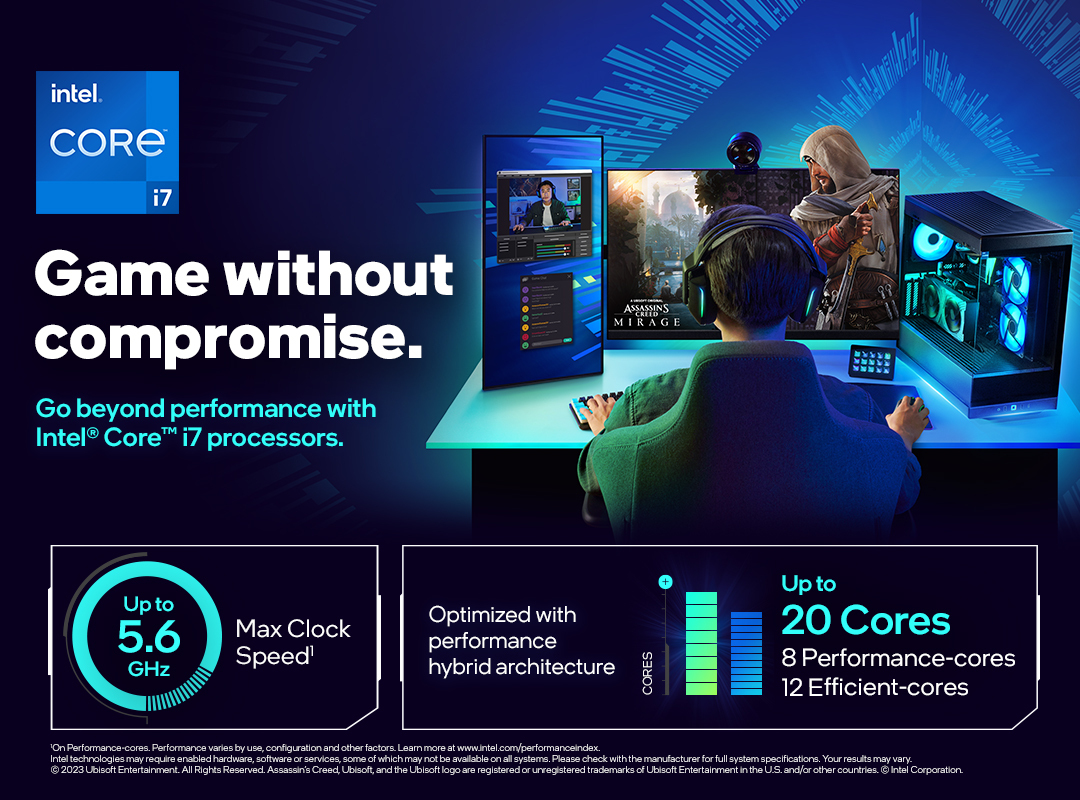
For Gamers with Professional Workloads
Intel Core i7 Processor 14700K
Cores (P+E): 8 + 12
Threads: 28
L3 Cache (Smart Cache): 33MB
L2 Cache: 28MB
Max Turbo Frequency: 5.6GHz
Processor Base Power: 125W
Maximum Turbo Power: 253W
RCP: $409-$419
The Intel Core i7-14700K is a CPU for the serious gamer. 'Serious' not just in the "I play games a lot" kind of way, but in the "I love gaming, but I also have serious, professional things to be doing with my time other than gaming" kind of way.
We're talking video editing, encoding, rendering, audio production, or even just some heavy everyday multitasking. Whatever the serious task is, the 14700K handles it well. How could it not, with an increase to 20 total cores (8x P-cores, 12x E-cores) and 28 threads? This thing is built for some heavy multi-threaded workloads.
The 14700K still shares the 14900K's and 14600K's benefits for gaming, though, which is why it's perfectly suited to the professional who is also a gamer (heck, it's suited to the professional gamer, too). Its 5.6GHz Max Turbo Frequency isn't far off the 14900K's flagship clock speed, and its generously sized stores of L2 and L3 cache should help in the gaming department, as well.
The Intel Core i7-14700K sits between the 14600K and 14900K, but it doesn't sit there unhappily. If you want gaming performance that's at least as good as the already stellar 14600K, but you think you might want a little extra juice (more cores, more cache, higher Turbo clock) for professional workloads, the 14700K is for you.
Of course, the 14900K delivers all this and more, but the 14700K's lower price tag makes the four fewer cores and 400MHz lower Turbo Frequency worth it if you're not dead-set on flagship performance. You'll still be able to churn through any modern game on max settings when paired with a good GPU, and you'll be able to handle professional or productivity workloads with ease.
Keep up to date with the most important stories and the best deals, as picked by the PC Gamer team.

